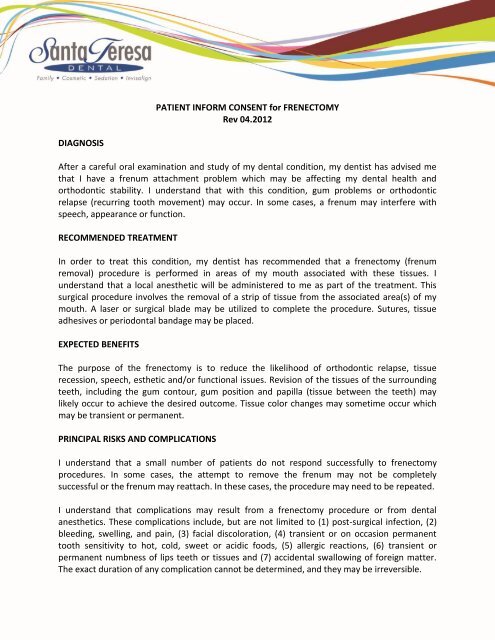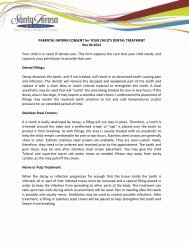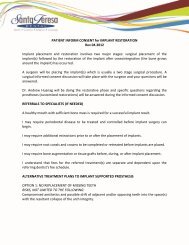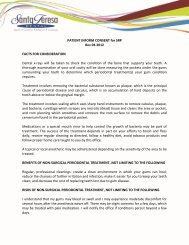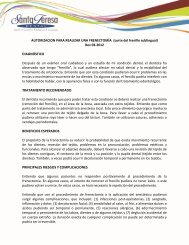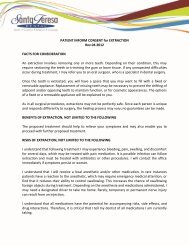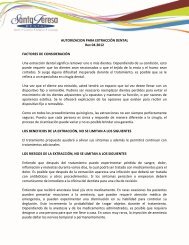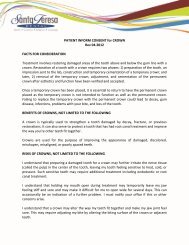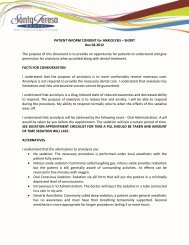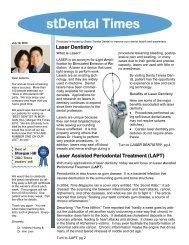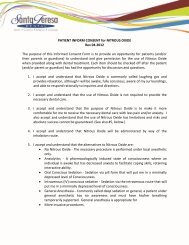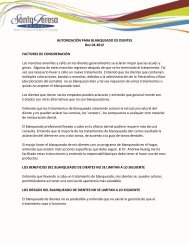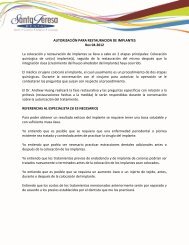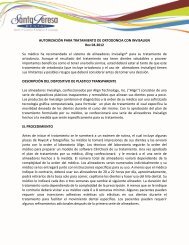Frenectomy - Consent Form
Frenectomy - Consent Form
Frenectomy - Consent Form
Create successful ePaper yourself
Turn your PDF publications into a flip-book with our unique Google optimized e-Paper software.
PATIENT INFORM CONSENT for FRENECTOMY<br />
Rev 04.2012<br />
DIAGNOSIS<br />
After a careful oral examination and study of my dental condition, my dentist has advised me<br />
that I have a frenum attachment problem which may be affecting my dental health and<br />
orthodontic stability. I understand that with this condition, gum problems or orthodontic<br />
relapse (recurring tooth movement) may occur. In some cases, a frenum may interfere with<br />
speech, appearance or function.<br />
RECOMMENDED TREATMENT<br />
In order to treat this condition, my dentist has recommended that a frenectomy (frenum<br />
removal) procedure is performed in areas of my mouth associated with these tissues. I<br />
understand that a local anesthetic will be administered to me as part of the treatment. This<br />
surgical procedure involves the removal of a strip of tissue from the associated area(s) of my<br />
mouth. A laser or surgical blade may be utilized to complete the procedure. Sutures, tissue<br />
adhesives or periodontal bandage may be placed.<br />
EXPECTED BENEFITS<br />
The purpose of the frenectomy is to reduce the likelihood of orthodontic relapse, tissue<br />
recession, speech, esthetic and/or functional issues. Revision of the tissues of the surrounding<br />
teeth, including the gum contour, gum position and papilla (tissue between the teeth) may<br />
likely occur to achieve the desired outcome. Tissue color changes may sometime occur which<br />
may be transient or permanent.<br />
PRINCIPAL RISKS AND COMPLICATIONS<br />
I understand that a small number of patients do not respond successfully to frenectomy<br />
procedures. In some cases, the attempt to remove the frenum may not be completely<br />
successful or the frenum may reattach. In these cases, the procedure may need to be repeated.<br />
I understand that complications may result from a frenectomy procedure or from dental<br />
anesthetics. These complications include, but are not limited to (1) post-surgical infection, (2)<br />
bleeding, swelling, and pain, (3) facial discoloration, (4) transient or on occasion permanent<br />
tooth sensitivity to hot, cold, sweet or acidic foods, (5) allergic reactions, (6) transient or<br />
permanent numbness of lips teeth or tissues and (7) accidental swallowing of foreign matter.<br />
The exact duration of any complication cannot be determined, and they may be irreversible.
There is no method that will accurately predict or evaluate how my gum and underlying bone<br />
will heal. I understand that there may be a need for a second procedure if the initial surgery is<br />
not satisfactory. In addition, the success of a frenectomy can be affected by (1) medical<br />
conditions, (2) dietary and nutritional problems, (3) smoking, (4) alcohol consumption, (5)<br />
clenching and grinding of teeth, (6) inadequate oral hygiene, (7) physical disruption (i.e. contact<br />
sports) and (8) medications that I may be taking. To my knowledge, I have reported to the<br />
dentist any prior drug reactions, allergies, diseases, symptoms, habits, or conditions which<br />
might in any way relate to this surgical procedure. I understand that my diligence in providing<br />
the personal daily care recommended by my dentist and taking all prescribed medications is<br />
important to the ultimate success of the procedure.<br />
ALTERNATIVES TO SUGGESTED TREATMENT<br />
My dentist has explained alternative treatments for my frenum problem. These include no<br />
treatment and continued monitoring for progressive tissue disturbances, speech problems,<br />
esthetic concerns, functional disruption or tooth movement.<br />
NECESSARY FOLLOW-UP CARE AND SELF-CARE<br />
I understand that it is important for me to continue to see my dentist for regular dental care.<br />
Existing restorative dentistry, hygiene maintenance and orthodontic treatment can be an<br />
important factor in the success or failure of my surgical treatment.<br />
I recognize that natural teeth and their artificial replacements should be maintained daily in a<br />
clean, hygienic manner. I will need to come for appointments following my surgery so that my<br />
healing may be monitored and so that my dentist can evaluate and report on the outcome of<br />
surgery upon completion of healing. Smoking or alcohol intake may adversely affect gum<br />
healing and may limit the successful outcome of my surgery. I know that it is important (1) to<br />
abide by the specific prescriptions and instructions given by the dentist and (2) to see my<br />
dentist for periodic examination and preventative treatment. Maintenance also may include<br />
adjustments of prosthetic appliances.<br />
NO WARRANTY OR GUARANTEE<br />
I hereby acknowledge that no guarantee, warranty or assurance has been given to me that the<br />
proposed treatment will be successful. In most cases, the treatment should provide benefit in<br />
reducing the cause of my condition and should produce healing which will help me keep my<br />
teeth. Due to individual patient differences, however, a dentist cannot predict certainty of<br />
success. There is risk of failure, relapse, additional treatment, or even worsening of my present<br />
condition, including the possible loss of certain teeth, despite the best of care.


